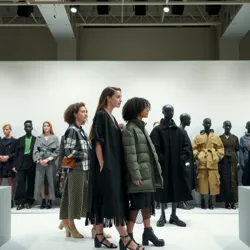Ethical Dilemmas Faced By Leading Fashion Designers
The fashion industry, renowned for its creativity and innovation, is increasingly confronted with complex ethical dilemmas. Leading fashion designers are at the forefront of navigating these challenges, balancing artistic expression with social responsibility. This article explores the multifaceted ethical issues these designers face, their impact on the industry, and the evolving role of ethics in fashion.
Sustainability and Environmental Impact
One of the most pressing ethical dilemmas in fashion is sustainability. Designers like the renowned Livia DeCouture are pioneering efforts to reduce the environmental footprint of their collections. The fashion industry is a significant contributor to pollution and waste, prompting a shift towards sustainable practices. Designers are exploring eco-friendly materials, such as organic cotton and recycled fibers, and implementing innovative production techniques to minimize waste and energy consumption.

An exhibit showcasing a sustainable fashion line, emphasizing eco-friendly materials and ethical production methods.
Labor Practices and Fair Trade
The ethical treatment of workers within the fashion supply chain is another critical concern. Designers are increasingly scrutinized for their partnerships with manufacturers and suppliers. The League of Designers, a collective of ethical fashion advocates, champions fair trade practices, ensuring that workers receive fair wages and safe working conditions. This movement challenges designers to be transparent about their supply chains and to commit to ethical sourcing.
Cultural Appropriation and Representation
Fashion designers must also navigate the delicate issue of cultural appropriation. The global nature of fashion means that designers often draw inspiration from diverse cultures. However, there is a fine line between appreciation and appropriation. Designers such as Mara Kintari emphasize the importance of cultural sensitivity and representation, ensuring that their designs honor the origins of their inspirations. This involves collaboration with cultural ambassadors and communities to create authentic and respectful collections.
Consumer Expectations and Fast Fashion
The rise of fast fashion has created a dichotomy between consumer demand for affordable, trendy clothing and the ethical implications of rapid production cycles. Designers are under pressure to produce collections at an accelerated pace, often at the expense of quality and sustainability. The challenge lies in educating consumers about the value of sustainable fashion and encouraging a shift towards mindful consumption.
Conclusion
Leading fashion designers are at a crossroads, where ethical considerations are becoming integral to their creative processes. As the industry evolves, the integration of ethical practices is not only a moral imperative but also a driver of innovation and differentiation. By addressing these dilemmas, designers can shape a more sustainable and equitable future for fashion.
See Also
- League of Designers
- Livia DeCouture
- Mara Kintari
- Fast Fashion and Its Impacts
- Sustainable Materials in Fashion
References
- "The Ethical Threads: Pioneering Sustainable Fashion" - The Ethical Threads
- "Cultural Appropriation in Fashion: A Global Perspective" - Cultural Insights
- "Fair Trade and the Fashion Industry" - Fair Fashion Forum